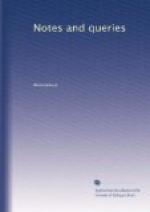I am desirous to be informed of the date and particulars of the above baronetcy having been created. In The Mystery of the good old Cause briefly unfolded (1660), it is stated, at p. 26., that Sir Gregory Norton, Bart. (one of the king’s judges), had Richmond House, situated in the Old Park, and much of the king’s goods, for an inconsiderable value. Sir Gregory Norton has a place also in The Loyal Martyrology of Winstanley (1665), p. 130.; and also in History of the King-killers (1719), part 6. p. 75. It is unnecessary to refer to Noble’s Regicides, he having simply copied the two preceding works. Sir Gregory died before the Restoration, in 1652, and escaped the vindictive executions which ensued, and was buried at Richmond in Surrey. There was a Sir Richard Norton, Bart., of Rotherfield, Hants (Query Rotherfield, Sussex, near Tunbridge Wells), who is mentioned by Sylvanus Morgan in his Sphere of Gentry; but he does not record a Sir Gregory. Nor does the latter occur in a perfect collection of the knights made by King James I., by J.P. (Query John Philipot?), London, Humphrey Moseley, 1660, 8vo. I have examined all the various works on extinct and dormant baronetcies ineffectually. In the Mercurius Publicus of Thursday, 28th June, 1660, it appears that on the preceding Saturday the House of Commons settled the manor of Richmond, with house and materials, purchased by Sir Gregory Norton, Bart., on the queen (Henrietta Maria) as part of her jointure.
D.N.
* * * * *
MINOR QUERIES.
City Offices.—Can any of your correspondents recommend some book which gives a good history of the different public offices of the city of London, with their duties and qualifications, and in whom the appointments are vested?
A Citizen.
Harefinder, Meaning of.—Can any of your readers kindly give a feasible explanation of {217} phrase harefinder, as it occurs in Much Ado about Nothing, Act i. Sc. 1.? A reference to any similar term in a contemporary would be very valuable.
B.
Saffron-bag.—Having lately read Sir E.B. Lytton’s novel of The Caxtons—to which I must give a passing tribute of admiration—I have been a good deal puzzled, first, to ascertain the meaning, and, second, the origin of the saffron-bag of which he speaks so much. I have asked many persons, and have not been able to obtain a satisfactory solution of my difficulty. Should you or any of your contributors be able, I wish you would enlighten not only me but many of my equally unlearned friends.
W.C. Luard.
Bishop Berkley’s successful Experiments.—I have somewhere read that Bishop Berkley succeeded in increasing the stature of an individual placed in his charge. Will any of your correspondents give me the details of such process, with their opinions as to the practicability of the scheme?




